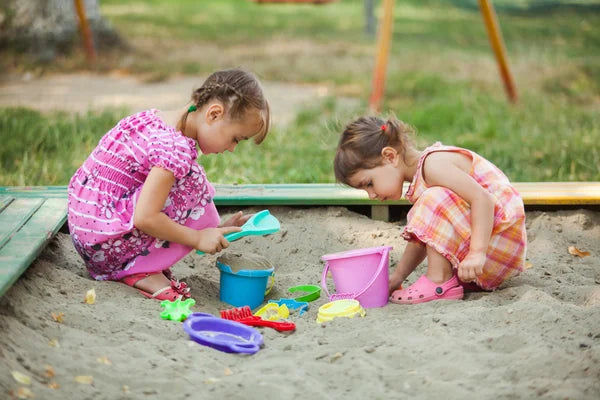Discover the Magic of Play Based Learning for Children

Play-based learning is an essential component of early childhood education, fostering cognitive, social, and emotional development in young children. This approach to learning combines guided play with purposeful exploration to create a rich and engaging environment for children to grow and thrive.
In this blog post, we will explore the advantages of play-based learning and how it can improve student academic outcomes, various strategies for parents and educators to engage children through playful activities, as well as the importance of outdoor play equipment and kids' kitchens in enhancing learning experiences. We will also explore various strategies that can be employed by parents and educators alike in order to effectively engage children through playful activities.
Furthermore, we will discuss the importance of outdoor play equipment as well as the use of kids' kitchens in enhancing student learning experiences. Ultimately, the part that parents take in backing their kid's growth through these instructive techniques will be looked into.
Benefits of Play-Based Learning
Engaging in play-based activities can provide multiple benefits for children's cognitive, social and emotional growth while stimulating their imagination and curiosity. By engaging in play activities that stimulate their imagination and curiosity, kids can develop a wide range of skills while having fun.
A. Improved Social Skills
Studies demonstrate that play-based learning can assist kids in honing key social skills, such as collaboration, communication and sympathy. When kids engage in group play or collaborative activities like building structures with blocks or playing pretend games together, they learn to share ideas and negotiate roles with others. This process not only strengthens their interpersonal relationships but also lays the foundation for successful interactions later in life.

B. Increased Creativity
Creative expression is another significant benefit of play-based learning for children. Through imaginative scenarios and open-ended toys like kids' kitchens, youngsters have the opportunity to explore new ideas without limitations imposed by structured lessons or predetermined outcomes. This freedom of expression permits kids to explore novel concepts and encourages the development of creative problem-solving skills, which will be invaluable in their future.

C. Enhanced Problem-Solving Abilities
The hands-on nature of many play activities allows children to experiment with different solutions when faced with challenges or obstacles during gameplay sessions. For example, constructing towers using various materials requires critical thinking skills as they determine which pieces work best together to create a stable structure. Through these interactive activities, children can hone their problem-solving skills and apply them to everyday scenarios.

D. Boosted Emotional Well-Being
For tiny yards, you may want to place your cubby house in a back corner, giving your child space to play and allowing you to put your favourite outdoor gear (like fire pits and grills) too.

E. Improved Academic Performance
Finally, the skills developed through play-based learning often translate into better academic performance as children grow older (source). The cognitive benefits of imaginative and exploratory play help foster critical thinking, memory retention, and language development - all vital components for success in school settings. Incorporating play-based learning into daily routines is an investment in your child's overall growth and development - one that will pay off both now and later down the road. The benefits of play-based learning are numerous, from developing social and emotional skills to fostering creativity. It is critical to contemplate approaches for captivating kids through play, given the many advantages of play-based education.

Key Takeaway:
Play-based learning is crucial for children's cognitive, social and emotional growth. It helps improve their social skills, creativity, problem-solving abilities and academic performance while boosting their emotional well-being. Incorporating play-based learning into daily routines is an investment in a child's overall development that will pay off both now and later down the road.
Strategies for Engaging Children Through Play
Engaging children through play is essential for their development and learning. By providing a variety of toys, activities, and environments that promote exploration and creativity, you can help your child grow in numerous ways. Here are some strategies to engage children through play effectively:
Create an Inviting Environment
An inviting environment encourages children to explore and learn at their own pace. Make sure the space is safe, comfortable, and well-organized with age-appropriate toys easily accessible. Providing open-ended materials like blocks or art supplies allows kids to use their imagination while playing.
Encourage Imaginative Play
Imaginative play, also known as pretend play or make-believe, helps develop critical thinking skills, problem-solving abilities, social skills, and language development among other benefits. Encourage this type of play by offering props such as dress-up clothes or toy kitchens which allow them to act out different scenarios.
Mix Structured Activities with Free Play Time
Structured activities: These are planned games or tasks that have specific goals or instructions (e.g., puzzles). They help teach new skills while keeping kids engaged.
Free play time: This is an unstructured time when children choose what they want to do without adult guidance (e.g., building with blocks). It promotes creativity and self-directed learning.
Incorporate Physical Activity into Playtime
Fostering physical activity during playtime not only improves overall health but also enhances cognitive function by increasing blood flow to the brain (source). Encourage activities like running, jumping, and climbing on outdoor play equipment or participating in sports.
Offer Choices and Allow Autonomy
Allowing children to make choices about their play fosters independence and self-confidence. Offer a range of toys that meet varying interests (e.g., vehicles, dolls) to give kids the freedom to pick what they'd like to do during playtime.
Promote Social Interaction through Playdates or Group Activities
Promoting social interaction is essential for honing communication skills and fostering cooperation, so consider organizing playdates or signing your child up for group activities. Organize playdates or enroll your child in group activities such as classes at the local community center where they can interact with other kids while playing together. By implementing these strategies into your daily routine, you'll create an engaging environment that promotes active learning through play for your child's development. Engaging kids and cultivating abilities that will be beneficial in the long run can be achieved through play-based learning, a successful approach. Moving on, outdoor play equipment can provide a variety of activities and experiences which can further enhance the development of young minds.
Key Takeaway:
Engaging children through play is crucial for their development and learning. Creating an inviting environment, encouraging imaginative play, mixing structured activities with free play time, incorporating physical activity into playtime, offering choices and allowing autonomy, and promoting social interaction through group activities are all effective strategies to engage children in active learning.
Outdoor Play Equipment for Kids
Outdoor play is essential for children's overall development, and incorporating outdoor play equipment can significantly enhance their experience. Providing kids with a variety of outdoor toys and structures encourages physical activity, exploration, and social interaction in a safe environment. In this section, we will discuss the importance of outdoor play equipment for kids and some popular options to consider.
A. Importance of Outdoor Play Equipment
Studies have indicated that participating in frequent outside play can lead to better physical health, psychological growth, mental well-being and social skills for youngsters. By offering diverse types of outdoor play equipment at home or school settings, kids are more likely to engage in active games that promote cardiovascular fitness, muscle strength, and flexibility. They can also satisfy their curiosity by exploring different textures (e.g., sandboxes), heights (e.g., climbing frames), or motion patterns (e.g., swings). Social interactions are fostered through cooperative games on playgrounds or sports fields, and risk-taking abilities develop as they challenge themselves with new activities within a secure setting.
B. Popular Types of Outdoor Play Equipment
To create an engaging backyard playground or contribute to your local park's offerings effectively, consider the following popular categories based on age-appropriateness:
Toddlers & Preschoolers:
Climbing Frames: These structures provide opportunities for young children to practice gross motor skills while exploring different heights and obstacles. Examples include Squigz Starter Set and Step2 Naturally Playful Woodland Climber.
Sandboxes: Playing in sand encourages sensory exploration, creativity, and fine motor skills development. Consider options like the Little Tikes Turtle Sandbox or a DIY sandbox project.

School-Aged Children:
Swings & Slides: Classic playground staples that promote physical activity while offering opportunities for social interaction among kids. Check out the Swing-N-Slide Cool Wave Slide or various swing set options available online.
Sports Equipment: Encourage teamwork and healthy competition with age-appropriate sports equipment such as soccer goals, basketball hoops, or tetherball sets.

Incorporating outdoor play equipment into your child's daily routine is crucial for their overall growth and well-being. By providing diverse activities within a safe environment, you can foster essential life skills while ensuring they have fun exploring the great outdoors.
Outdoor play equipment can be a great way to engage children in active, imaginative play that helps them develop physically and mentally. Utilizing kids' kitchens is another effective tool for encouraging learning through exploration and discovery.

Key Takeaway:
Outdoor play equipment is important for children's physical, cognitive, emotional and social development. By providing a variety of options such as climbing frames, sandboxes, swings and sports equipment in a safe environment, children can engage in active games that promote fitness while exploring different textures and heights. Incorporating outdoor play into daily routines fosters essential life skills and ensures kids have fun exploring the great outdoors.
Utilizing Kids Kitchens to Enhance Learning
One of the most engaging and educational toys for children is a kids kitchen. These playsets provide endless opportunities for creative expression, hands-on experiences with food preparation, and valuable life skills development. In this section, we will explore how kids' kitchens can be used to enhance learning in various ways.

A. Encouraging Imaginative Play
Kids kitchens are perfect for sparking imagination as they allow children to role-play different scenarios related to cooking and mealtime activities. By pretending to be chefs or restaurant owners, kids develop their storytelling abilities while also practising essential social skills such as communication, cooperation, and negotiation.
B. Developing Fine Motor Skills
Playing with a kids kitchen involves manipulating various utensils like spoons, forks, knives (plastic ones), pots, and pans which help improve fine motor skills in young children. This type of skill development is crucial for tasks that require precision and dexterity later on in life such as writing or playing musical instruments.
C. Introducing Basic Math Concepts
Math concepts can easily be integrated into playtime using a kids kitchen set by teaching simple counting techniques when adding ingredients or measuring out portions during pretend cooking sessions. Additionally, parents can introduce basic fractions through discussions about dividing food items equally among friends or family members during imaginary meals.
D. Fostering Healthy Eating Habits
A well-stocked kids kitchen provides an excellent opportunity for parents to discuss the importance of healthy eating habits with their little ones by incorporating fruits, vegetables, and other nutritious foods into playtime. This can help children develop a positive attitude towards healthy food choices from an early age.
E. Building Confidence and Independence
As children successfully navigate their way around a kids kitchen, they gain confidence in their abilities to complete tasks independently. Enabling children to lead the cooking activity can cultivate self-sufficiency and autonomy that will be beneficial in their lives.
Incorporating play-based learning through the use of kids' kitchens is not only fun but also highly beneficial for your child's development. Be sure to provide ample opportunities for exploration and creativity while enjoying quality time together in this engaging learning environment.
Kids kitchens can be a great tool for parents to use in order to engage their children with learning through play. Moving on, the role of parents is essential when it comes to promoting and encouraging play-based learning activities.

Key Takeaway:
Kids kitchens are a great tool for enhancing learning through play. They encourage imaginative play, develop fine motor skills, introduce basic math concepts, foster healthy eating habits and build confidence and independence in children. Incorporating kids' kitchens into playtime is not only fun but also highly beneficial for a child's development.
The Role of Parents in Play-Based Learning
A. Encouraging Exploration and Creativity
One of the key aspects of play-based learning is giving children the freedom to explore new ideas and engage with different materials or activities. Parents can foster exploration and creativity by providing a range of toys, games, art materials, and other items that cater to various interests. It's essential not to limit your child's imagination; instead, allow them to experiment with different forms of play without imposing too many rules or restrictions.
B. Providing Supportive Guidance
While it's important for children to have autonomy during playtime, parental support is also necessary for effective learning experiences. This means being present during play sessions when possible - observing your child's actions closely but not interfering unless needed - asking open-ended questions about what they're doing or creating (e.g., "What are you making?" rather than "Is that a house?"), as well as praising effort rather than just focusing on results.
C. Establishing Routines around Playtime
Create designated spaces: Set up specific areas within your home where certain types of play can take place (e.g., arts & crafts corner).
Schedule regular times: Allocate consistent periods throughout the day or week for play-based learning, ensuring that your child has ample opportunity to engage in creative exploration.
Model good behavior: Demonstrate the importance of cleaning up after playtime by participating in tidying activities together with your child.
D. Encouraging Social Interaction and Cooperation
Play-based learning affords children the possibility to hone their social aptitudes, a vital element of growth. Parents can facilitate this by organizing playdates or group activities where kids have the chance to interact with their peers while engaging in collaborative games or projects. Additionally, parents should encourage cooperative behaviors such as sharing toys and taking turns during play sessions.
E. Monitoring Progress and Adapting Strategies
Last but not least, it's important for parents to keep track of their child's progress during play-based learning experiences - noting any areas where they may need additional support or guidance - and adapting strategies accordingly based on individual needs/preferences. By staying involved throughout the process, you'll be better equipped to help your child reach their full potential through fun-filled educational adventures.

Key Takeaway:
Parents play a vital role in promoting and supporting play-based learning for their children. They can encourage exploration, provide guidance, establish routines around playtime, encourage social interaction and cooperation, monitor progress and adapt strategies accordingly based on individual needs/preferences to help their child reach their full potential through fun-filled educational adventures.
FAQs in Relation to Play Based Learning
What Current Research Says About Play-Based Learning?
Current research suggests that play-based learning promotes cognitive, social, emotional, and physical development in children. It fosters creativity, problem-solving skills, and resilience while also improving language abilities and executive functions. For more information on the subject, refer to this research article.
What Are the Benefits of Play-Based Learning Articles?
Play-based learning articles discuss various advantages such as improved academic performance, enhanced communication skills, increased self-confidence, and independence among children. These articles provide insights into how incorporating playful activities can support holistic child development effectively.
Why Is Play-Based Learning Important in Scholarly Articles?
Scholarly articles emphasize the significance of play-based learning because it aligns with natural developmental processes in young children's brains. They highlight its effectiveness in building foundational knowledge for future academic success by fostering curiosity and exploration through hands-on experiences.
What Are the Main Ideas of Play-Based Learning?
The main ideas of play-based learning include providing a stimulating environment where children can explore freely, encouraging open-ended activities that promote creativity, offering opportunities for collaboration, allowing kids to make choices, and facilitating meaningful interactions between adults and children during their explorations.
Conclusion
In conclusion, play-based learning offers numerous benefits for children's cognitive, social, and emotional development. Engaging kids through play can be achieved through various strategies such as storytelling, music, art, and imaginative games. Outdoor play equipment and kids' kitchens are also great tools to enhance their learning experience.
Parents can play an essential part in helping their child's learning through playing by providing them with chances to investigate and try out in a secure atmosphere. By encouraging their creativity and curiosity, parents can help foster a love of learning that will last a lifetime.
If you're looking for high-quality toys and resources to support your child's play-based learning journey, check out All Things For Kids. They offer an extensive range of educational toys, outdoor equipment, and furniture designed specifically for children.
